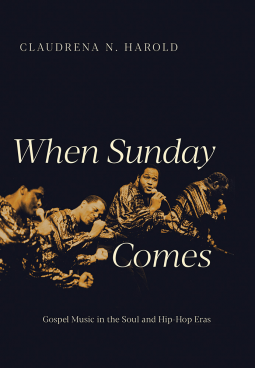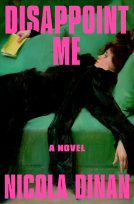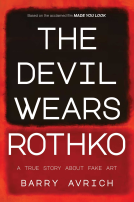
When Sunday Comes
Gospel Music in the Soul and Hip-Hop Eras
by Claudrena N. Harold
This title was previously available on NetGalley and is now archived.
Send NetGalley books directly to your Kindle or Kindle app
1
To read on a Kindle or Kindle app, please add kindle@netgalley.com as an approved email address to receive files in your Amazon account. Click here for step-by-step instructions.
2
Also find your Kindle email address within your Amazon account, and enter it here.
Pub Date Oct 27 2020 | Archive Date Jan 05 2021
Talking about this book? Use #WhenSundayComes #NetGalley. More hashtag tips!
Description
Gospel music after the Golden Age
Gospel music evolved in often surprising directions during the post-Civil Rights era. Claudrena N. Harold's in-depth look at late-century gospel focuses on musicians like Yolanda Adams, Andraé Crouch, the Clark Sisters, Al Green, Take 6, and the Winans, and on the network of black record shops, churches, and businesses that nurtured the music. Harold details the creative shifts, sonic innovations, theological tensions, and political assertions that transformed the music, and revisits the debates within the community over groundbreaking recordings and gospel's incorporation of rhythm and blues, funk, hip-hop, and other popular forms. At the same time, she details how sociopolitical and cultural developments like the Black Power Movement and the emergence of the Christian Right shaped both the art and attitudes of African American performers.
Weaving insightful analysis into a collective biography of gospel icons, When Sunday Comes explores the music's essential place as an outlet for African Americans to express their spiritual and cultural selves.
Claudrena N. Harold is a professor of African American and African studies and history at the University of Virginia. She is the author of New Negro Politics in the Jim Crow South and The Rise and Fall of the Garvey Movement in the Urban South, 1918–1942.
Advance Praise
"When Sunday Comes is the book we’ve been waiting for--a thoughtful and thought-provoking analysis of the impact contemporary singers, songwriters, and musicians have made, and continue to make, on gospel music. With this volume, Claudrena Harold makes a valid argument for scholars to look more closely at this important period in gospel music history."--Robert M. Marovich, author of A City Called Heaven: Chicago and the Birth of Gospel Music
Available Editions
| EDITION | Other Format |
| ISBN | 9780252085475 |
| PRICE | $22.95 (USD) |
| PAGES | 288 |
Links
Featured Reviews
 Ian K, Reviewer
Ian K, Reviewer
In this insightful study of gospel music Professor Harold begins with a personal introduction explaining how family and community influences shaped her experience and understanding of gospel music.
From Reverend James Cleveland through the 1960s the author traces developments and debates in the gospel music industry to BeBe and CeCe Winans and Take 6 in the 1990s.
Cleveland signing with the Savoy record label for a rumoured 6 figure annual salary with a contract requiring several albums a year was a clear indication that it really had become an industry. It saw him have popular and commercial success to the extent of regularly having several songs concurrently in the top ten in the gospel charts. The Gospel Music Workshop of America, which he founded to develop and promote young talent, is an organisation that now numbers some 75,000 and features throughout When Sunday Comes.
Cleveland's criticism of Mighty Clouds of Joy when they had a "rock gospel" hits with the ABC label, arguing that in rock gospel the music takes precedence over the message is another recurring theme of the book.
The criticism of those who were perceived to have "sold out" by gospel purists for their collaboration in the secular realm continued to be a theme with Andrae Crouch and his involvement in film and TV. The uneasy relationship between Gospel Music and Contemporary Christian Music is considered in Crouch who often performed to predominantly white audiences. His appeal was due in part to the rise of the culturally radical Jesus Movement but it wasn't always a neat fit leading him to announce to one crowd "to those of you from the First Church of the Frigidaire, you don't have to do nothing. But if you come from the other side of the tracks ... we want you to clap your hands and join in with us" which seemed to break the ice.
Chronicling the careers of artists including Shirley Caesar, Walter Hawkins brother of Edwin Hawkins of the crossover hit O Happy Day, Reverend Al Green who started in pop music and made the transition into gospel, the Clark Sisters and groups such as Echoes, Commissioned and the Winans, Harold also considers the Detroit sound and classic black record labels such as Savoy and House of Beauty and their relationship with predominantly white labels Benson, Sparrow and Word.
In When Sunday Comes Professor Harold combines extensive research with access to first hand sources to produce a masterful documentary written from the perspective of a fan and an insider.
 Dee A, Reviewer
Dee A, Reviewer
My initial introduction to gospel happened one Sunday when a fellow keyboardist (he was an organist) offered to take me to his church on Easter Sunday. There were two services, with roughly 75-100 people in each. My organist friend and a pianist handled all the backing music, with the voices of all the people in that small church providing the body and soul of each song. It became one of those rare life experiences that one seldom forgets. Unfortunately, it did not cause me to further investigate the world of gospel music until I read “When Sunday Comes;”
The Internet was my friend during this reading and I periodically stopped to perform deeper research, primarily so I could listen to the music the author described. The initial song I pulled up was “Peace Be Still,” by the Reverend James Cleveland. One can feel the raging waters spoken about in the song, and his masterful handling of the lyrics and as well as the choir’s musical arrangement fully explained his phenomenal success. To say this song is moving would be a vast understatement.
Over and over I was awed by author Claudrena N. Harold’s skillful descriptions. Even though listening to the actual recording was enjoyable, the book offered the next best thing. If I wouldn’t have been able to find the recording, I would still have had a pleasant and accurate experience. These descriptions were the author’s five-star element. Ms. Harold’s ability to weave words into a musical tapestry seemed effortless, and even if I could not physically hear all the different songs mentioned, the author ensured that I would have a full understanding.
I knew very few of the artists in the book. I had seen Andrae Crouch on television a few times and appreciated his music, and while I knew Al Green from his first career he was not a musician who caused me to wait breathlessly until his next album came out. It was interesting to learn that he built a second career for himself. Others were new names to me: The Clark Sisters, Commissioned, Milton Brunson, BeBe and CeCe Winans, and the rest.
However, even though I had never heard of these folks nor listened to their music, Ms. Harold kept me interested throughout the entire book. I wished that there would have been longer stories of the artists featured in this book rather than the short chapters that skimmed through the artists’ lives. I also wished that I would have investigated gospel music right after receiving that first taste on a Spring day. While I could have been enjoying it all this time, I am glad to have found this book and reawakened a desire and passion to return to that day. Four stars.
My thanks to NetGalley and the University of Illinois Press for a complimentary electronic copy of this book.
A fascinating book where politics, history and music collide. Very well written, and it was amazing to learn more about it. Would recommend!
When Sunday Comes Claudrena N. Harold
Gospel Music in the Soul and Hip-Hop Eras
by Claudrena N. Harold
University of Illinois Press
I enjoyed reading this work. The author is passionate about his subject matter and has lived his research. The writing is clear and accessible. When Sunday Comes is a history of gospel music, and the church from which it grew. Focusing on the 1960s to the present day, the work explores gospel music’s key figures and deconstructs its controversies.
Martin Luther King Jr once argued that ‘America was never more segregated than at 10am on a Sunday Morning’ when Black and white Americans worship in their own rigidly segregated establishments. This work looks at how Gospel music has been used as a tool to unify the church and a weapon in the fight to keep it segregated.
The book explores the movements rise to dominance within both the secular and sacred worlds: looking at; Gospel music’s influence on stars, such as Michael Jackson and Madonna. For example, it looks at the collaboration between Madonna and Andraé Crouch on the song Like a Prayer. Also, it explores the pivotal role that it has played in the growth of the American.
This book provides a look at the music that shaped America and how America, and its politics shaped the music and the religion that it supports. It is a valuable lens through which to understand 21st century America.
When Sunday Comes: Gospel Music in the Soul and Hip-Hop Eras (Music in American Life) by Claudrena N. Harold is a biography of the many who have contributed to contemporary gospel music over the last fifty years.
Written against the backdrop of the Charlottesville, Virginia white supremacist rallies in 2017, the book explores the commercialisation of gospel music, as soul and hip-hop dominate the radio over the last three decades of the twentieth century. The book is subtle in its opinion that when gospel strays too far into being similar in style to secular music.
Nostalgic despite my not being raised in the US, but being so influenced by the US on this side of the Atlantic, the African-American gospel culture has crept over to the Black British experience and I recognised names of many of the artists referred to in the book. The book also introduced me to artists such as James Cleveland who wrote the totemic song Peace Be Still. It is testament to him that his influence remains on the gospel music world today. This is not only down to his creation of the Gospel Music Workshop of America, but also down to the collaborations he had as well as the songs he created. For example, his recording of Amazing Grace with Aretha Franklin achieved both gospel and secular success.
The book was thoroughly researched, and I had to pause reading as I also curated a playlist on Spotify based on the songs referenced throughout the book. Listening to the songs mentioned through the book brought it alive, as you could imagine choirs singing along. They also reawakened aural memories, as I realised I had heard some of these songs as they have featured heavily in films about the Black struggle in the USA, as well as general American cultural references.
As someone who grew up on Motown, it was really interesting to learn that Detroit was also a cultural home of gospel, as it was also the home of the Clark Sisters, the Winans and Commissioned. Consequently, it would be fair to say that Detroit is the spiritual and soulful home of African American music.
The influence of the artists mentioned in When Sunday Comes on secular musicians such as Beyonce, Missy Elliot, Mariah Carey and Xscape is not to be ignored. Consequently, for anyone who is a fan of hip hop and RnB I would definitely recommend this book, even if you are not familiar with gospel music.
*** Thank you to Netgalley and University of Illinois Press for this advanced reader copy in exchange for this honest review.***










